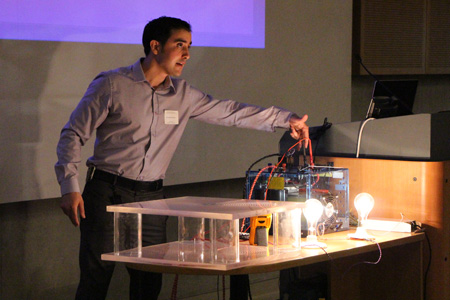 Hybrid-electric vehicle researcher Narayan Kar makes a point during his lecture Friday at a workshop on electric vehicle technology.
Hybrid-electric vehicle researcher Narayan Kar makes a point during his lecture Friday at a workshop on electric vehicle technology.
A tremendous amount of research is still required to make electric vehicles an economically viable option for most consumers, but that presents a rare opportunity for investors looking to establish themselves in the sector, according to an engineer who specializes in hybrid-electric powertrains.
“It’s a trillion dollar market that we don’t want to lose,” said Narayan Kar, an engineering professor at the University of Windsor and a Canada Research Chair in Hybrid Drivetrain Systems. “My grandchildren will certainly be driving electric vehicles. I’d like to see them driving Canadian made electric vehicles.”
Dr. Kar was playing host to the The Institute of Electrical and Electronics Engineers, which held its fourth annual workshop on electrified vehicle components and systems at the university’s brand new Ed Lumley Centre for Engineering Innovation. Experts from around the world gathered to discuss the latest in electric vehicle technology.
Consumers have been slow to embrace electric vehicles, and indeed, the challenges are many, Kar said. Most know electric vehicles are good for the environment, but in order for large scale consumer buy-in, there needs to be infrastructure for access to quick charging, reliable and long-lasting batteries, increased range, and costs that are comparable to traditional combustion engine vehicles, he said.
“It’s all about relationships,” said Kar, whose research is focused on optimizing the range and efficiency of hybrid electric motors. “Maybe they aren’t ready for that relationship with an all-electric vehicle. Maybe they just want more romance in that relationship.”
Michael Schneider is one consumer who loves his electric vehicle. An employee at GreenSun Rising, a Windsor-based designer of solar powered generation systems, he’s been driving a Chevy Volt since February. He’s put about 12,000 kilometres on the vehicle so far, but has only consumed about 280 litres of gas.
“It’s more expensive to buy than a gas-powered vehicle, but in the long run, I still think it’s more economical,” said Schneider, who delivered a first-person account at the workshop of what it’s like to own and operate an electric car.
Many European cities have embraced electric vehicles, even incorporating availability of them into their public transportation systems, according to Daniela Chrenko, a professor at the Institut Supérieur de l'Automobile & des Transports in France. There are plenty of opportunities for North American cities to follow that lead and help create new markets for research and development, she said.
“This can be a good string to pull,” she said. “If you look at the history of the auto industry, there were a lot of small companies everywhere, so electric cars may provide a lot of potential for small and medium-sized companies.”
Universities provide an excellent environment for those small and medium-sized companies to partner with academic researchers to address the challenges the electric vehicle faces, said Kar. And those partnerships already happen on a regular basis, according to his department head.
“At least once a week, I’m signing a contract to engage a faculty member with a local industry,” said Maher Sid-Ahmed, head of Electrical and Computer Engineering.

Graduate student Bryan Estaban demonstrates a wireless power transfer system that harnesses electricity from a magnetic field. He believes it could be incorporated into electric vehicles, eliminating the need to plug them in.
